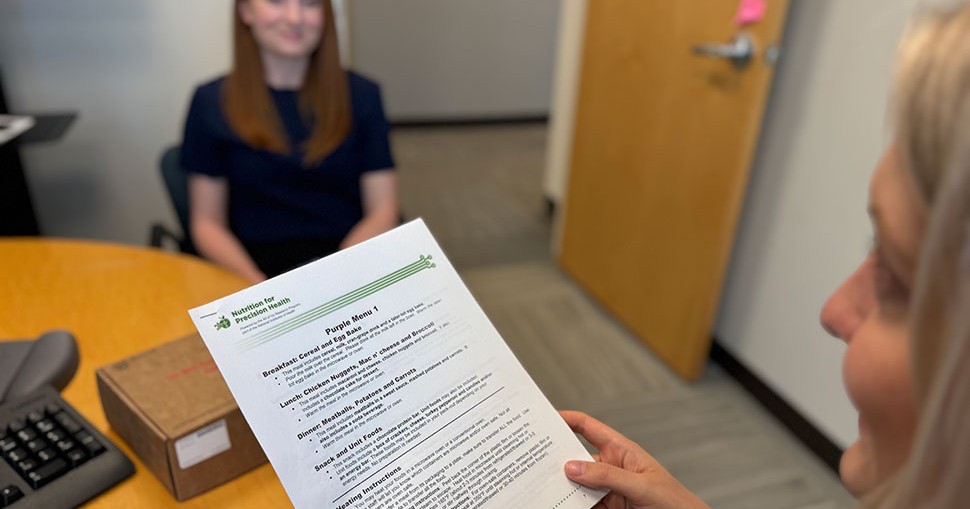
- Northwestern is part of NIH’s largest precision-nutrition research effort of its kind
- Goal is to one day develop diet recommendations based on someone’s genetics and metabolism
- Study prioritizes a diverse health database to inform thousands of studies on a variety of health conditions
CHICAGO — Can a personalized diet help improve health and prevent chronic diseases?
That’s the question at the center of the ongoing nationwide study, Nutrition for Precision Health (NPH) — the largest precision-nutrition research effort of its kind — which is researching how individuals respond to different foods.
Powered by the National Institutes of Health’s (NIH) All of Us Research Program, scientists from Northwestern University and 13 other clinical centers across the U.S. are researching how nutrition can be tailored to each person’s genes, culture and environment to improve health.
“Precision nutrition, also known as personalized nutrition, is moving away from ‘one-size-fits-all’ diet recommendations,” said Linda Van Horn, professor of preventive medicine at Northwestern University Feinberg School of Medicine and one of the senior principal investigators of the Illinois Precision Nutrition Research consortium, comprised by Northwestern, The University of Chicago and Illinois Institute of Technology. “The goal is to eventually develop diet recommendations based on an individual’s genetics and metabolism.”
Two modules of nutrition research
Individuals interested in joining NPH in Illinois may be eligible to participate in two different modules of nutrition research. The first involves participants answering surveys about what they typically eat, followed by extensive tests measuring blood pressure, heart rate, blood lipids, glucose and other biomarkers. The second involves a feeding study in which the study provides prepared meals for two weeks followed by retesting at the clinical center. This is repeated three times total with meals that vary in composition. All participants will also undergo meal challenge tests that measure biological changes after they consume a standardized study-provided meal or drink.
NPH links participants’ data from the study to information obtained through the All of Us Research Program, including genetics information and data from electronic health records and additional surveys. The study leverages advances in artificial intelligence to analyze this vast amount of data from participants to develop algorithms predicting how a person will respond to a particular food or diet based on various factors.
Diversity of All of Us, the largest health database
Launched in May of 2018, the goal of the All of Us Research Program is to create the largest health database that researchers could use to better understand disease and achieve the ambitious goal of individualized health care for all.
It aims to do so by partnering with institutions like Northwestern to gather health data from 1 million or more diverse participants nationwide, with a goal of at least 70% of participants being from populations that are underrepresented in biomedical research (UBR), or groups historically not well represented in biomedical research, including clinical trials. UBR groups include, but are not limited to, age, gender, education, ethnicity, income, race and sex.
Six years later, the research program has recruited more than 800,000 participants across the country, with nearly 18,000 being from Northwestern. Almost 90% of national All of Us participants are from UBR communities, which is essential for achieving a diverse health database that can inform thousands of studies on a variety of health conditions.
‘Diversity of Chicago is an asset’
The All of Us Illinois consortium, which includes Northwestern, The University of Chicago, University of Illinois Chicago, Rush University Medicine Center and Endeavor Health, is uniquely positioned to recruit underrepresented communities because of its home base in Chicago, Ho said.
“The diversity of Chicago is an asset, but it also means we need to be respectful of different communities,” said Joyce Ho, research associate professor of preventive medicine at Feinberg School and principal investigator of the Northwestern University arm of the All of Us study. “We’ve developed our recruitment strategy to include talking to patients about what it means to participate in biomedical research, how they feel about it, and making sure we address the injustices and abuse many communities in the U.S. have experienced in research studies in the past.”
Study improves diversity of researchers, data
More than 10,000 researchers use the All of Us Researcher Workbench, a goal the study exceeded two years early, Ho said. Scientists can access different tiers of data in the cloud-based platform in their studies. View recent studies powered by All of Us data and tools.
“It’s important we make sure researchers have access to it who are not just the typical researchers,” Ho said. “We have a lot of researchers from underrepresented communities and underserved institutions.”
